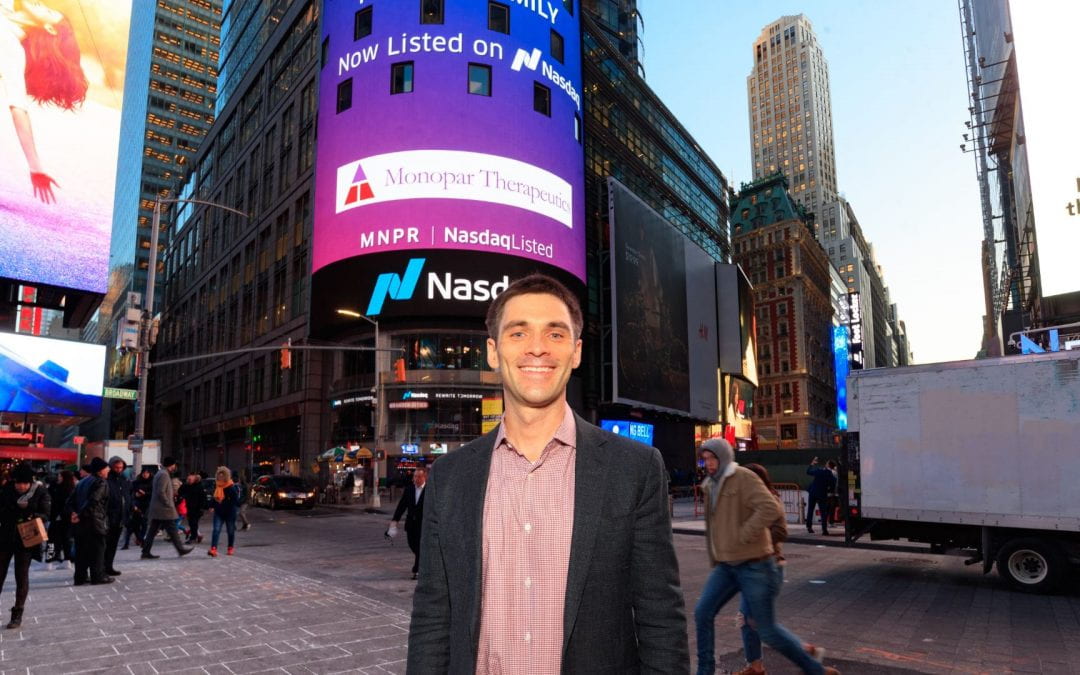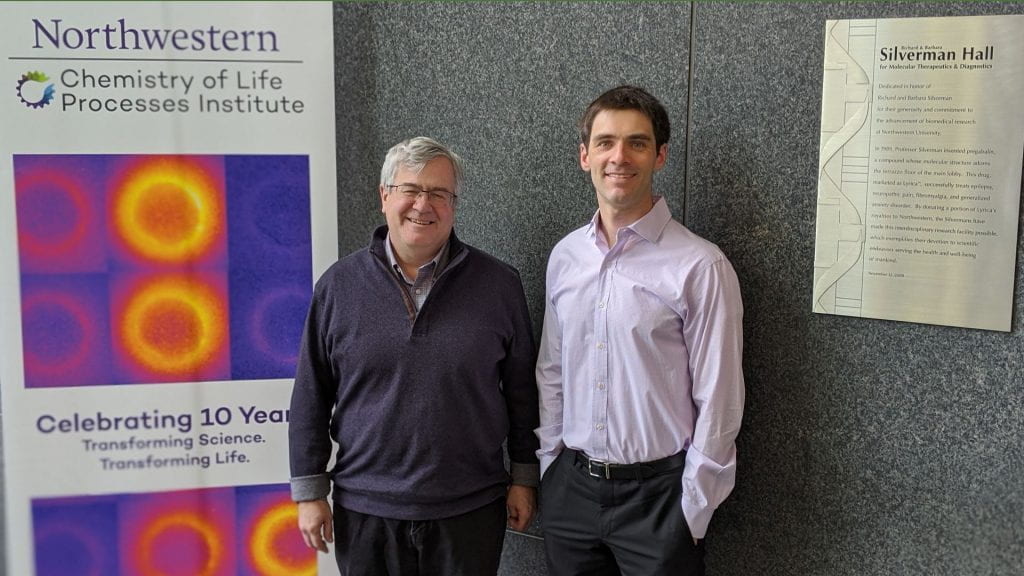What happens when a highly interdisciplinary and integrated team of scientists, business leaders and students work together across fields of fundamental science, discovery, development, and finance? In the case of Monopar Therapeutics, a Chemistry of Life Processes Institute-affiliated spin-out, it leads to a record-breaking initial public offering.
Last month, Monopar (MNPR), a clinical stage biopharmaceutical company that develops proprietary therapeutics for cancer, experienced the “best first-day pop for an IPO since Baidu in 2005,” according to Nasdaq News. The company’s stock price rocketed 231 percent from its initial offering, reaching a market valuation of $289 million on its first day.
“It’s been a remarkable journey from the start,” says Chandler Robinson, MD, CEO of Monopar, and member of CLP’s Executive Advisory Board.
From Math Major to MD
Robinson’s academic journey began in 2002 as a math major at Northwestern. He changed direction after enrolling in Professor Thomas O’Halloran’s general chemistry course. O’Halloran, the founding director of Chemistry of Life Processes Institute, recognized Robinson’s prodigious intellect and curiosity and encouraged him to pursue science.
“Tom was always very much a mentor and a friend. He made it enjoyable,” said Robinson. “When I got to Northwestern, I had no intention of even majoring in the sciences. Because of Tom, I kept the math and picked up a second major in chemistry.”
While conducting basic research in O’Halloran’s lab, Robinson published a breakthrough paper in the journal Science analyzing the science behind the active agent in a drug that came to be known as Decuprate™, a promising inorganic therapeutic agent for the treatment of copper overload in Wilson disease.
While at Northwestern, he also founded an undergraduate research society, still operating today after more than a decade, and graduated summa cum laude. He continued with his education and earned a master’s degree in International Health Policy and Health Economics from the London School of Economics on a Fulbright Scholarship, an MBA from Cambridge University on a Gates Scholarship, and an MD from Stanford University. During breaks, he completed internships with Onyx Pharmaceuticals, Bear Stearns and helped CLP faculty and board members start Tactic Pharma to develop Decuprate and several orphan cancer drug candidates.
“My path has always been, keep an open mind, see what opportunities arise, and if a door opens up, jump through it,” explains Robinson.
The Perfect Storm
Robinson’s insights into Decuprate™ prompted O’Halloran, the Charles E. and Emma H. Morrison Professor of Chemistry and Professor of Molecular Biosciences, to contact internationally recognized drug developer Andrew Mazar, then Chief Scientific Officer at Attenuon, LLC in San Diego, to join a CLP Public Private Partnership proposal to the National Cancer Institute. After Attenuon closed its doors in 2009, Mazar accepted a research faculty appointment at Northwestern and joined CLP as the Institute’s first Entrepreneur-in-Residence. He also co-founded the Institute’s Center for Developmental Therapeutics and started the University’s first animal model facility, the Developmental Therapeutics Core.
Mazar and O’Halloran approached Chandler in 2010 about helping them launch Tactic Pharma, LLC to develop and commercialize several assets including Decuprate™.
“We had some valuable assets, but needed someone to help us start a robust company,” said O’Halloran. “I said, ‘Why don’t we take a chance and bring in this NU alum and freshly minted MBA from Cambridge Business School to lead this effort?’ Although Chandler didn’t have business development experience under his belt, he had the most important ingredients: talent, energy, and especially the drive to pull it all together.”
Robinson rose to the challenge and took an extended leave of absence from Stanford Medical School to head the new company. Michael Brown, CEO, Euronet Worldwide, and a CLP Executive Advisory Board (EAB) member, stepped up with the initial start-up funding, providing the key early stage investment capital. Within 18 months, the Tactic team had obtained orphan drug status for Decuprate™ from the Food and Drug Administration, manufactured it, and raised more than $10M in a Series A. The drug went on to get acquired by Alexion for $855 million, and is currently in phase III clinical trials.
Robinson returned to Stanford to complete his medical degree.
“It was the perfect storm,” said O’Halloran. “From the beginning, our team shared the desire to make a difference and bring drugs more quickly to the market to help people. CLP started with the mission to stimulate translation of basic science discoveries made at the bench. We want to bring our combined skill sets together to solve major problems and address unmet needs in the medical field and get new drugs and devices out into society as quickly as possible.”
Enter Monopar Therapeutics
The Tactic team then changed course and developed new partnerships to commercialize other assets. In 2015, Robinson and Mazar partnered with Christopher M. Starr, PhD, a highly successful and experienced biopharmaceutical entrepreneur who co-founded BioMarin (Nasdaq: BMRN, ~$15B market cap) and Raptor Pharma (acquired by Horizon Therapeutics for $800M). The new company, Monopar Therapeutics, was financed by Tactic and an array of new investors with the mission to build a leading oncology drug development company.
“Having known the intelligence, drive to succeed, and creativity of Chandler [Robinson] and the talent of Andrew [Mazar], I thought it would be prudent to invest in Monopar Therapeutics. After hearing about the assets they are developing, it was a no-brainer,” says Rick Silverman, Patrick G. Ryan/Aon Professor at Northwestern, and inventor of the blockbuster drug Lyrica®.
Starr brought experienced team members from his prior successful biotech companies into the rapidly growing Monopar team. They asked Brown to join the board of this new Chicago startup based in Wilmette, Illinois.
Monopar acquired its first asset from Tactic, MNPR-101, a monoclonal antibody invented by Mazar. The antibody, currently in the preclinical phase of development, targets an important receptor that acts as a choke point for cancer metastasis. Decommissioning the receptor eliminates cancer’s favorite escape routes.
“We’ve generated exciting preclinical data on some of the more aggressive deadly cancers such as pancreatic, ovarian, and metastatic breast cancer,” says Mazar.
Monopar licensed its second asset, Validive®, from a public company in France called Onxeo. Validive® prevents a very painful and debilitating condition called severe oral mucositis (SOM) in oropharyngeal cancer (OPC) patients, which is a condition that currently has no approved treatment.
Before licensing the drug, the team noted that Onxeo had conducted the phase II clinical trials of the drug in all head and neck cancer patients.
“I looked at the data and thought, ‘this really should be focused on oropharyngeal cancer,’ which is a specific type of head neck cancer,” says Mazar. “I knew this backwards and forwards because I had literally just been through treatment for oropharyngeal cancer a couple of years before that.”
They found OPC patients did considerably better on the drug than the full population. They also knew that the OPC patient population was the fastest growing because of human papillomavirus (HPV) disease.
Very positive patient responses in phase II clinical trials earned Validive® fast track designation in the US and orphan drug designation in the EU. Phase III clinical trials are anticipated to launch soon in 60-80 sites.
Monopar’s second clinical stage agent, camsirubican, is a novel analog of doxorubicin, a drug widely used to treat adults and children with solid and blood cancers, including bladder, breast, gastric and ovarian, soft tissue sarcomas, leukemias and lymphomas.
“We’re going after, as a first indication, advanced soft tissue sarcoma, which has a life expectancy of around 12-15 months from the time of diagnosis,” says Robinson. The current first-line treatment is doxorubicin. The problem with doxorubicin is that it works through a dose dependent mechanism. As you get more of the drug, you get better efficacy results, but you also get higher rates of irreversible heart damage. The patient is faced with a situation where they may die from the drug if they stay on it too long, or die from the cancer if they stop taking the drug and the cancer progresses.
After completing animal studies, as well as phase I and a small phase II clinical trial of camsirubican, the team, thus far, has seen no evidence of the irreversible heart toxicity seen with doxorubicin. A larger phase II trial will begin in the next 6 months with the hope of demonstrating the anticancer activity of doxorubicin without the irreversible heart damage.
“The oncology community is very eager for a replacement of doxorubicin in the treatment of advanced soft tissue sarcomas,” says Robinson.
With the money raised from its successful IPO last month, “we can go full steam ahead,” says Mazar.
The Secret Sauce
“It really boils down to the people. We have a team that really enjoys working together on something that we believe in, and where we are trying to make a positive impact. It is a very inspiring environment,” says Robinson. “When you bring those people and elements together, you can do something special. That’s also what I have seen consistently over time with CLP.”
Brown, who invested early in both Tactic and Monopar, concurs.
“CLP has been so effective at translating basic science to society because it brings together people that understand the business world in ways academic scientists rarely do,” says Brown. “The evolution of Tactic and Monopar are great examples of this. I have done nine Wall Street offerings, raised probably $2 billion ranging from my first deal, and I would have to say Chandler, Andrew, and the Monopar team pulled together the most amazing outcome I have seen in this IPO.”
by Lisa La Vallee
Feature image: Chandler Robinson, MD, CEO of Monopar Therapeutics

